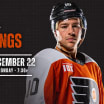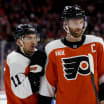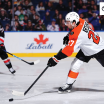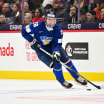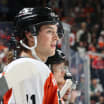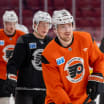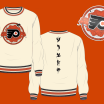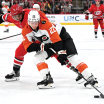For much of their histories and easily from the mid-1970s to late 1980s, there were only two things that the Philadelphia Flyers and the New York Islanders could easily agree upon. They hated one another with a passion and they mutually despised the New York Rangers even more.
After an ebb in enmity intensity from the mid-1990s to late 2010s, the Islanders are now once again among the Flyers' top rivals within their division. Playing each other in a recent playoff series will do that.
Rival in Focus: New York Islanders
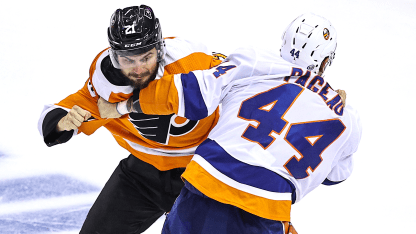
By
Bill Meltzer
philadelphiaflyers.com
The Flyers made big strides last season. They cut their goals against average dramatically, went into the playoffs as the Eastern Conference top seed (by virtue of a round-robin sweep of Boston, Washington and eventual Stanley Cup champion Tampa Bay), and won a playoff round for the first time since 2012
When all was said and done, however, the Islanders defeated the Flyers in seven games in the Eastern Conference Semifinals. This came on the heels of the Flyers failing to win a single game against the Islanders during the regular season.
During the playoff series, the Islanders presented a three-pronged threat to the Flyers. Their top skill players, starting with Mathew Barzal, proved tough to contain. Secondly, the Flyers had a hard time physically competing against the Islanders' big-framed near the top of the lineup, namely Anders Lee (6-foot-3, 231 pounds) and Brock Nelson (6-foot-3, 212 pounds), as well as their feisty and physically aggressive supporting group.
Lastly, the Islanders did a good job of taking away time and space from the Flyers for large portions of the series. New York forechecked quite well and also blocked a lot of Philadelphia shots. The Flyers made an adjustment to handling the Islanders' forecheck by tweaking their breakout patterns and especially via high flips of the puck out of the defensive zone with aggressive pursuit in the neutral zone. It worked for a while but New York then counter-adjusted to what the Flyers were doing.
Most games in the series saw the Islanders control roughly two-third of regulation -- the Flyers often had either a strong first or second period, but never both -- and then New York got the better of most of the third periods. That was a disappointment, as the Flyers had been one of the NHL's best third-period teams all season right up through their closeouts of the Montreal Canadiens in nailing down a first-round victory. The Flyers near saving grace in the New York series came via pulling out three separate overtime wins.
Heading into the 56-game 2020-21 season, the Islanders face some significant challenges to taking the next step toward returning to the Stanley Cup Final for the first time since their dynasty of four straight Stanley Cup championships came to an end in 1984 at the hands of burgeoning Edmonton Oilers dynasty.
BETTER LATE THAN NEVER WITH BARZAL
Until January 9, the 23-year-old Barzal remained unsigned as a restricted free agent. The two sides were unable to work out the terms of a long-term deal so they finally agreed to a three-year bridge deal with a $7 million average annual value (AKA cap hit). The contract temporarily puts the Islanders above the NHL's salary cap ceiling; but there are strategies available for becoming compliant when the opening night roster is set.
Veteran defenseman Thomas Hickey and veteran winger Leo Komarov are rumored to be the players that general manager Lou Lamoriello could move out to free up the needed space. Leaguewide, however, many teams are strapped to the flat cap ceiling.
Thirty-one-year old fourth line bruising winger Matt Martin remains an unrestricted free agent as of this writing. Thirty-eight-year-old defenseman Andy Greene is back with the Islanders on a PTO (professional try-out) arrangement in camp.
Longtime stalwart NHL defenseman Johnny Boychuk suffered a serious eye injury on March 3, 2020, after his right eyelid was accidentally cut by the skate blade of Montreal Canadiens forward Artturi Lehkonen. The Islanders were missing the 36-year-old Boychuk for all but three playoff games and still reached the Eastern Conference Final. Nonetheless, Boychuk's retirement due to the injury will be felt by the team on the ice and in the locker room. Capwise, his $6 million cap hit can be used toward long-term injured reserve (LTIR) allowance if the Islanders exceed the ceiling.
Under head coach Barry Trotz, the Islanders have overhauled their team identity within two seasons. It seems like a distant memory now that the 2017-18 New York Islanders under Doug Weight were dead last in the NHL in goals against average and seemingly reeling in the offseason after John Tavares departed for Toronto as an unrestricted free agent.
The very next year under Trotz, the Islanders went from worst to first in the NHL in goals against average. The team transformed from an unstructured and undisciplined club to one of the toughest clubs in the league to play against precisely because of their mix of structure, size, skill and depth. There isn't a slew of star power, especially on the blueline, but it's a deep and capable team throughout the lineup. New York can roll four good lines, all of which bring something to the table to excel in different types of matchups.
The Islanders have some aging pieces in the lineup. Team captain Lee turned 30 over the summer. Jordan Eberle and Josh Bailey are all in their 30s, too. Fourth-line pest (and noted Flyer nemesis) Cal Clutterbuck is 33, as is Komarov. Starting goalie Semyon Varlamov, who earned two shutout against the Flyers in the playoffs last season, is 32. Casey Cizikas, who has emerged as one of the better fourth-line centers across the entire NHL, is 29 years old and a potential unrestricted free agent after this season. All of these players are still effective NHLers.
However, 35-year-old Andrew Ladd appears to be in steep decline. Ladd spent 34 games last season with the AHL's Bridgeport Sound Tigers and only four with the Islanders. On the flip side, 28-year-old Jean-Gabriel (J-G) Pageau was a valuable addition last season via trade with the Senators and gave the Islanders a formidable 1-2-3 punch through the middle plus Cizikas at center on the fourth line.
The New York blueline may not have any Norris Trophy candidates but it's sound. Ryan Pulock, whom the Flyers bypassed in the first round of the 2013 Draft, has a bomb of a point shot that's often good for double-digit goals pro-rated to a full season. Nick Leddy is a sturdy veteran at age 29. Late-blooming Adam Pelech, 26, brings a reliable all-around game.
Nineteen-year-old Oliver Wahlstrom, a pure sniper, is entering his second pro year after primarily playing in the AHL last season. Meanwhile, the Islanders have been waiting for 22-year-old KIeffer Bellows to develop into a high-grade sniper in the pro game but he still has youth on his side. Meanwhile. former 2014 first-round pick Josh Ho-Sang, who was not invited to training camp, is now 24 and may be on his way out of the organization after four tumultuous pro seasons. Twenty-three-year-old defenseman Sebastian Aho has shown puck-moving acumen at the AHL level.
FLYERS VS. ISLANDERS SEASON SERIES SCHEDULE
Jan. 30: New York Islanders
@ Flyers
Jan. 31: New York Islanders @ Flyers
Mar. 18: Flyers @
New York Islanders
Mar. 20: Flyers @
New York Islanders
Apr 3: Flyers @
New York Islanders
Apr. 8: Flyers @
New York Islanders
Apr. 18: New York Islanders @ Flyers
Aprl. 25: New York Islanders @ Flyers
RIVALRY HISTORY
The Islanders entered the NHL as an expansion team in 1972. Unlike most franchises of the pre ultra-generous NHL Expansion Draft format that enabled the Las Vegas Golden Knights to build an instant Stanley Cup contender, the Islanders entered the NHL in an era when expansion clubs were expected to pay their dues for a long, long time before painstakingly building a viable contender.
The New York Islanders were the rare exception. The brilliance of the late Bill Torrey as a general manager and the late Al Arbour as a head coach enabled the fledgling team to become a contender in their third year of existence. Very rapidly, the Islanders built a stellar nucleus, led first by future Hockey Hall of Fame defenseman Denis Potvin (the first overall pick of the 1973 Draft), rugged forwards Bob Nystrom and Clark Gillies, veteran former Bruins forward Ed Westfall,talented winger Billy Harris and the goaltending duo of the gregarious Glenn "Chico" Resch and the volatile Billy Smith.
In the 1975 Eastern Conference quarterfinals, the Islanders made history. Trailing the Pittsburgh Penguins three games to zero, the Islanders won each of the next four games to become just the second team in NHL history to pull off the feat. In the semifinal, the Islanders opposed the defending Stanley Cup champion Flyers.
Philadelphia roared out to a three games to zero lead (4-0, 5-4 in overtime, and 1-0). The resilient Islanders staved off elimination at the Nassau Coliseum in Game 4 with a 4-3 overtime victory on a J.P. Drouin goal. Then New York dealt the Flyers a rare loss at the Spectrum in Game 5, in a 5-1 decision. Back in Long Island, the Islanders forced a Game 7 on the strength of a stellar goaltending performance by Resch and a third-period game-winner by Gerry Hart.
Thankfully for the Flyers, there was to be no second straight miracle series comeback for the Islanders. At the Spectrum in Game 7, Gary Dornhoefer scored on the game's opening shift and then Rick MacLeish compiled a hat trick in a convincing 4-1 Flyers win. Bernie Parent saw just 15 shots for the entire game.
The Flyers went on to defeat the Buffalo Sabres in the 1975 Stanley Cup Final, capturing the championship for the second straight year. The next year, the Flyers took a a third consecutive trip to the Final before an injury-riddled squad (missing both Hall of Fame goalie Parent and the high-scoring MacLeish) got swept by the Montreal Canadiens in three one-goal decisions and a two-goal margin in a game that had been tied in the third period. The Habs earned their trip to the Final by virtue of beating the Islanders in five games in the Cup semis.
As the 1970s progressed, the Islanders drafted the likes of Hall of Fame forwards Bryan Trottier (chosen 22nd overall in 1974) Mike Bossy (selected 15th overall in the 1977 Draft). Triottier made an immediate impact as a rookie in 1975-76 and Bossy became a perennial 50 to 60-plus goal scorer right from the get-go. John "Tonto" Tonelli joined the Isles from the World Hockey Association in 1978-79 and became a difference maker in his own right. Swedish draftees Stefan Persson, a defenseman, and forward Anders Kallur also came aboard in the latter part of the 1970s. A fourth-round pick in 1977, "Miracle on Ice" Team USA defenseman Ken Morrow joined the Isles after winning gold at the 1980 Olympics in Lake Placid and became a fixture in the New York lineup for 10 seasons. Finally, a trade with the LA Kings that sent Harris and Dave Lewis to Los Angeles brought Butch Goring to Long Island.
In 1979-80, the year of the Flyers' North American pro sports record setting 35-game unbeaten streak, Philadelphia played the Islanders in the Stanley Cup Final. The series was a classic but a devastatingly painful memory for the Flyers and their fans.
New York prevailed in six games to win their first Stanley Cup. First and foremost, it happened because the Islanders power play was scorching hot in the Final. A 4-3 overtime loss at the Spectrum for the Flyers in the series opener proved costly for Philadelphia. Finally, and most infamously, the Islanders' championship-winning 5-4 overtime win in Game 6 came under extremely controversial circumstances.
A first period goal by Denis Potvin appeared to be played with a high stick. Later in the opening period, in one of the most infamous blown calls in NHL history, linesman Leon Stickle missed a blatant offside on an eventual goal by Duane Sutter. In an eventual overtime game, these two rulings had a huge impact on the final outcome.
The 1980 Cup Final marked the beginning of a frustrating period of Flyers history. The team often excelled in the regular season, but exited the playoffs in the first round, year after year. The Islanders, meanwhile, collected four straight Stanley Cup championships. These years were the zenith of the Islanders' franchise history. New York's quest for a fifth straight Cup was ended by the Edmonton Oilers in five games during the 1984 Stanley Cup Final. Three of the four Edmonton wins were blowouts. The Oilers went on to become arguably the greatest championship dynasty in post-1967 NHL history as they won five Stanley Cup championships (two directly at the Flyers' expense in the 1985 and 1987 Cup Finals) in a seven-year period.
Being dethroned by the Oilers marked the end of an era for Islanders. The club remained a contender for several more years, but the Islander have never been back to the Cup Finals in the last 36 years. On a year-by-year basis in the mid-1980s, as the nucleus aged or otherwise exited Long Island, the team gradually slipped.
In 1985, the Flyers played the Islanders in the second round (Patrick Division Final). Philadelphia prevailed in five games. Brilliant goaltending by Vezina Trophy winner Pelle Lindbergh, including a 25-save shutout in the Flyers' clinching 1-0 win at Spectrum in Game 5, was the No. 1 key. Also crucial: a Brian Propp hat trick in Game 2 and game-breaking shorthanded goal the next match gave the Flyers all the momentum in the series. The late Ilkka Sinisalo closed it out by scoring the only goal for either team in Game 5.
Two years later, Philly and New York met again. With both the 1985 and 1987 series were physical and sometimes downright ornery clashes, the latter eclipsed the first. It was an outright war of attrition that went the full seven games.
Finally, in Game 7, the Flyers won a convincing 5-1 decision at the Spectrum. First period goals from a likely source (Propp, shorthanded) and two unlikely ones (enforcer Dave Brown at even strength and shorthander by defensive defenseman Brad Marsh) put Philly in the driver's seat and a pair of third period goals by Sinsalo made the outcome a foregone conclusion. Rookie goalie Ron Hextall, the Vezina Trophy and Conn Smythe Trophy winner that season, flirted with a shutout for 59 minutes before Potvin scored an otherwise meaningless goal in the last minute of play.
The Flyers, ultimately, fell just one win short of winning the 1987 Stanley Cup. In terms of the rivalry with the Islanders, the second-round war that year was the fourth series between the clubs in a 13-year span. It would also be the last one until the Islanders beat the Flyers in seven games in 2020.
Philadelphia and the Islanders had their share of regular season battles over the 33-year span between playoff clashes. However, the Islanders slipped a bit down the chain of the Flyers' most hated rivals until just recently; going from one of their most hated enemies to one of the teams in the next grouping down.
Much of the reason for this was that, by the time the Flyers worked though a five-year spell of missing the playoffs (1989-90 to 1993-94) to re-emerge as a Cup contender, the Islanders were sliding toward an even darker, lengthier down period in their post-dynasty history.
For a little while, during the brief NHL career of Eric Lindros' younger brother Brett (derailed due to concussions), there was some juice to Flyers' games against the Islanders. Playing against Brett's club tended to bring out dominant performances from "the Big E" and his Legion of Doom running mates John LeClair and Mikael Renberg.
The Isles played the Flyers tough in the mid-1990s, and picked off a few wins (particularly at Nassau Coliseum), but Philly got the better of it overall except in the 1996-97 and 1989-99 season series, when the Cup-contending Flyers only managed one victory apiece despite the Islanders struggling against most of the rest of the league.
By 2001, the Islanders seemed to be on the brink of re-emerging as a bonafide threat to the top teams in the Eastern Conference.. Unfortunately, a lengthy string of disastrous trades, ill-considered free agent signings by general manager Mike Milbury and some sheer bad luck with injuries plus internal budget restrictions took a major toll.
From 1994-95 to 2018-19, the Islanders never advanced beyond the second round even once in 24 years. A second-round loss under Jack Capuano in 2015-16 marked the only time in this time span that New York won as much as one playoff round. Meanwhile, the team failed to qualify for the playoffs in 16 of those campaigns -- including stretches of seven straight seasons and five consecutive years. Even the arrival of the ballyhooed John Tavares in 2009-10 really didn't springboard the team much, although the player became a star as predicted.
For a number of years from the 2007-08 season series through 2013-14, the Flyers basically had their way with the Isles. In a span of 36 games against each other, Philadelphia enjoyed a gaudy 30-3-3 record.
Since that time, there have been swings in the momentum when the teams play each other. Some years it's been rather even, other times the Flyers or Islanders have rattled off multiple consecutive wins at the other's expense.
In 2017-18, the Islanders won three of four games against the Flyers (although two of the victories came in overtime or via shootout). In 2018-19, the season series was a 2-2 split. In 2019-20, the Islanders collected two regulation wins and a comeback overtime win against the Flyers in the regular season series that preceded New York beating the Flyers in the Eastern Conference Semifinal in seven games.



